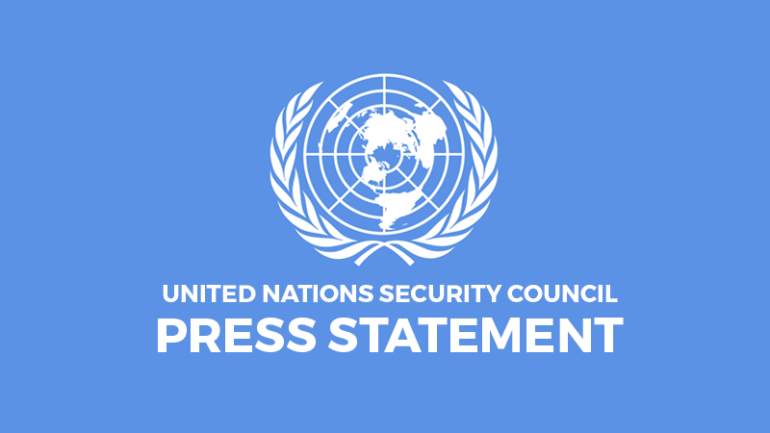United Nations Security Council Press Statement on Libya

- Posted by admin
- Posted in Press Statement
The following Security Council press statement was issued today by Council President Ruchira Kamboj (India):
The members of the Security Council expressed their deep concern at the persistent political deadlock in Libya and disappointment at the lack of progress, which continues to risk the achievement of stability and the unity of the country, almost one year after elections were scheduled to take place on 24 December 2021, and more than two years after the agreement of the Libyan Political Dialogue Forum Roadmap.
The members of the Security Council expressed their strong support for Special Representative of the Secretary-General for Libya and Head of the United Nations Support Mission in Libya (UNSMIL) Abdoulaye Bathily and his efforts to generate new momentum in Libya’s stalled political process and improve stability in the country. They welcomed the Special Representative of the Secretary-General’s extensive consultations with Libyan stakeholders and the international community. They reiterated their call on all Libyan parties and key stakeholders to engage in dialogue with the Special Representative of the Secretary-General and each other constructively, fully, in a spirit of compromise and consensus, and in a transparent and inclusive manner. They called for all actors to preserve the prevailing calm on the ground, and to come together under United Nations auspices to agree swiftly a path forward, to finalize the political settlement, including the constitutional basis, in order to conduct free, fair, transparent and inclusive national presidential and parliamentary elections as soon as possible across the country, and encouraged all actors to complete their efforts in this regard.
The members of the Security Council reiterated their strong support for the people of Libya to determine who governs them through elections and to ensure this legitimate demand is heard through the political process. They recalled that all Libyan stakeholders previously gave strong guarantees to support and respect the independence and integrity of the electoral process, as well as the election results, and called upon them to uphold these guarantees, in line with their political responsibilities to the Libyan people. The members of the Security Council committed to supporting inclusive intra-Libyan dialogue in this regard, aiming at, inter alia, forming a unified Libyan Government able to govern across the country and representing the whole of Libya’s people.
The members of the Security Council underlined the importance of an inclusive, comprehensive national dialogue and reconciliation process based on the principles of transitional justice and encouraged continued efforts of the Presidential Council with the support of UNSMIL and the African Union in that regard. They called for the full, equal, effective and meaningful participation of women at all levels, including in leadership positions, and in all activities and decision-making relating to political transition, conflict resolution and peacebuilding, and the inclusion of youth and civil society representation. They also underlined the importance of providing a safe environment for civil society organizations to work freely and to protect them from threats and reprisals.
The members of the Security Council noted that progress on the political process should be accompanied by constructive engagement in the economic and security tracks, as well as improvements in respect for human rights. To this end, they reaffirmed the importance of establishing a Libyan-led mechanism bringing together stakeholders from across the country to set spending priorities and ensure oil and gas revenues are managed in a transparent, equitable, accountable manner to benefit the Libyan people and with effective Libyan oversight.
The members of the Security Council called on all parties to uphold the 23 October 2020 ceasefire agreement and reiterated their call on all parties to accelerate full implementation of its provisions, including the Action Plan agreed by the 5+5 Joint Military Commission in Geneva on 8 October 2021, which is to be implemented in a synchronized, phased, gradual and balanced manner. In this regard, the members of the Security Council urged Member States to respect and support its full implementation, including through the withdrawal of all foreign forces, foreign fighters and mercenaries from the country without further delay. They recalled the need to plan for security sector reform and to progress towards the demobilization, disarmament and reintegration of armed groups, as agreed by the 5+5 Joint Military Commission on 8 December. They underscored the need for establishment of an inclusive, unified, accountable, civilian-led security architecture for Libya as a whole, and reiterated their call on the Libyan authorities, including the 5+5 Joint Military Commission, to redouble their efforts in this regard.
The members of the Security Council called upon the international community to fully support UNSMIL and Special Representative of the Secretary-General Bathily in their consultations with different Libyan stakeholders and international partners, and in this regard, they encouraged Special Representative of the Secretary-General Bathily to take advantage of the contributions of neighbouring countries and regional organizations in finding a lasting and peaceful solution to the Libyan crisis.
The members of the Security Council recalled that the measures set out in resolution 1970 (2011), as modified by subsequent resolutions, shall apply to individuals and entities determined by the United Nations Libya Sanctions Committee to be engaging in or providing support for acts that threaten the peace, stability or security of Libya or obstruct or undermine the successful completion of its political transition, including by obstructing or undermining elections. They further demanded full compliance by all Member States with the arms embargo imposed under resolution 1970 (2011), as modified by subsequent resolutions.
